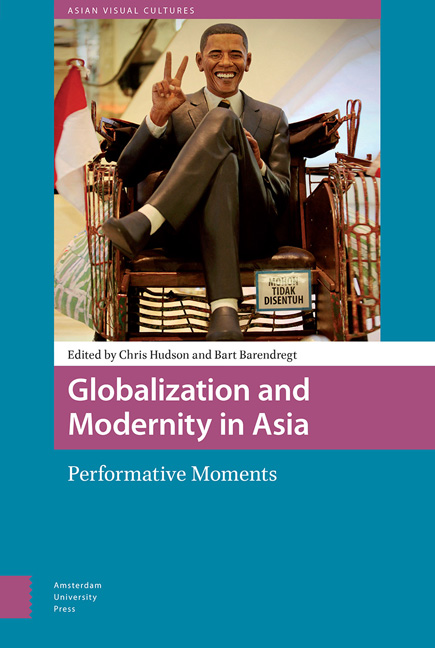Book contents
- Frontmatter
- Contents
- List of Figures
- Acknowledgments
- 1 Global Imaginaries and Performance in Asia
- 2 Globalizing the Imagination: Introductory Reflections
- 3 Weddings, Yoga, Hook-ups: Performed Identities and Technology in Bali
- 4 Super Premium Soft Double Vanilla Rich and the Ideal of Convenience in Japan
- 5 Unearthing the Past and Re-imagining the Present: Contemporary Art and Muslim Politics in a Post-9/11 World
- 6 Keeping Communists Alive in Singapore
- 7 Performative Pedagogies: Lifestyle Experts on Indian Television
- 8 Performing Cities: The Philippines Pavilion at the 2010 Shanghai International Exposition
- 9 Mobile Performance and the In-between: Yogyakarta Comes to Melbourne
- 10 An Islamist Flash Mob in the Streets of Shah Alam: Unstable Genres for Precarious Times
- 11 Pure Love?: Sanitized, Gendered and Multiple Modernities in Chinese Cinemas
- 12 Yogya on Stage
- Index
4 - Super Premium Soft Double Vanilla Rich and the Ideal of Convenience in Japan
Published online by Cambridge University Press: 11 December 2020
- Frontmatter
- Contents
- List of Figures
- Acknowledgments
- 1 Global Imaginaries and Performance in Asia
- 2 Globalizing the Imagination: Introductory Reflections
- 3 Weddings, Yoga, Hook-ups: Performed Identities and Technology in Bali
- 4 Super Premium Soft Double Vanilla Rich and the Ideal of Convenience in Japan
- 5 Unearthing the Past and Re-imagining the Present: Contemporary Art and Muslim Politics in a Post-9/11 World
- 6 Keeping Communists Alive in Singapore
- 7 Performative Pedagogies: Lifestyle Experts on Indian Television
- 8 Performing Cities: The Philippines Pavilion at the 2010 Shanghai International Exposition
- 9 Mobile Performance and the In-between: Yogyakarta Comes to Melbourne
- 10 An Islamist Flash Mob in the Streets of Shah Alam: Unstable Genres for Precarious Times
- 11 Pure Love?: Sanitized, Gendered and Multiple Modernities in Chinese Cinemas
- 12 Yogya on Stage
- Index
Summary
Abstract
Playwright-director Okada Toshiki is one of the leading theatre artists to emerge from Japan in last decade. With his theatre group chelfitsch he has developed a style of theatre that is intensely localized and at the same time suggestive of the characteristic ‘non-places’ of globalization (as identified by the French anthropologist Marc Augé). Okada's work has an ambient dramaturgy that matches the everyday sense of dislocation and inertia that is one of the overwhelming experiences of globalization. I examine one of his plays set in a convenience store (konbini) and draw comparisons to the depiction of konbini in the visual arts work of Nakamura Masato. Both artists express cautionary messages about the human consequences of konbini as a chief manifestation of what will be discussed here as the convenience economy.
Keywords: Japan, convenience store, visual arts, performing arts
Capitalist deterritorialization acts on desire such that it is no longer human, properly speaking, but machinic. Desire is not the expression of human subjectivity; it emerges from the assemblage of human and non-human flows, from a multiplicity of social and technical machines.
– Lazzarato 2014, p. 51The convenience store or konbini is a ubiquitous machinic presence in Japan’s urban landscape and spreads into most rural settings across the main islands. Konbini are open 24 hours a day, seven days a week and are staffed by low-wage contract employees, many of them drawn from the so called ‘freeter generation’ (furītā), people who have grown up in the lengthy economic and social malaise of the post-bubble era and who ‘float’ from one job to another without career prospects or job security. Customers like konbini for their clean facilities and regularized product lines – they are, in a word, convenient. Moreover, this experience of convenience is expressed in a double way. For the franchise owner, the convenience factor is that they are able to employ staff under liberal employment laws at low cost and circumnavigate urban planning laws designed to regulate the spread of large shopping malls. For the customer, the expectation that konbini will be always available and easy to access is the convenience; the products are also expressive of convenience as they feature a range of prepared and easily consumed foods and drinks, magazines, and other products that might be needed at short notice, ranging from portable phone chargers, to stamina pills, nylons and condoms.
- Type
- Chapter
- Information
- Globalization and Modernity in AsiaPerformative Moments, pp. 57 - 70Publisher: Amsterdam University PressPrint publication year: 2018



